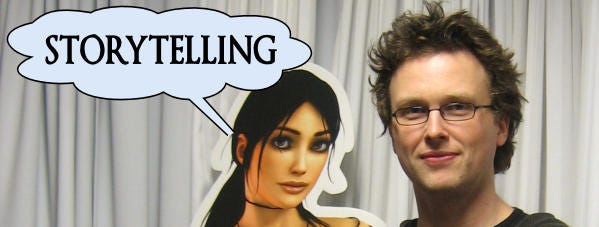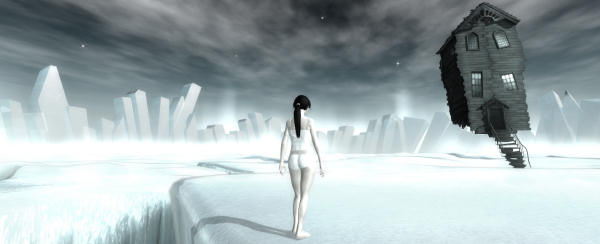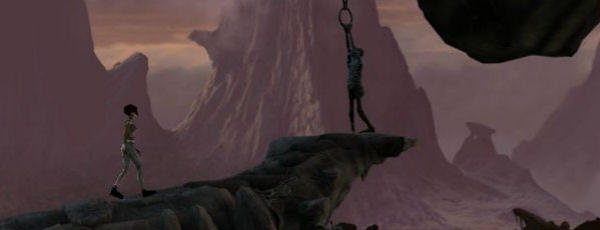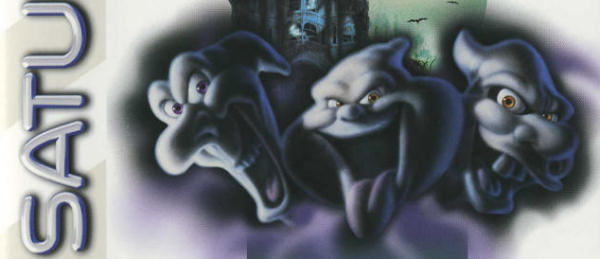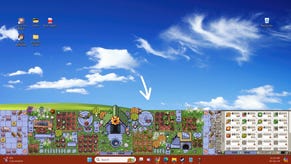Ragnar Tørnquist On... Storytelling
A few months back, before the release of Age Of Conan, I took a trip to Funcom to finally meet The Longest Journey creator, Ragnar Tørnquist. Having keenly followed his career since the wondrous The Longest Journey, he’s someone I’ve always wanted to interview. So at last given the chance, we sat down to chat… for over three hours. The results are now to be seen, and in this first part we begin by discussing the nature of MMOs, and then spend a lot of time talking about the role of the Storyteller in gaming, before finding out how Ragnar tried to get swearing into a Spielberg-endorsed kids’ game. (Portions of this interview previously appeared in PC Gamer).
RPS: What lessons have you learned from Anarchy Online?
Ragnar Tørnquist: Ship a finished game! Make sure it’s not broken. So people can actually log in and pay to play. [For those making peculiar conclusions based on this statement, it's in reference to Anarchy Online. Ragnar did not work on Conan, and as it says above, this took place before the launch of Conan.]
RPS: It seems like a lot of MMOs learn that lesson.
Ragnar: Yeah, everyone seems to have to learn that lesson at least once. Actually, Anarchy Online now – we’re passed that whole thing. I think most people remember AO as a really polished, if niche game. We’ve tried to do a lot of really cool things, like all developers approaching something new, you bite off more than you can chew… Dreamfall? [laughs] I’ve been talking to people about the AO setting and story recently, and even when there were technical problems, I think that stood out. But obviously where AO stumbled is it’s a very hardcore game. That’s fine you know. You’re making it for people who are hardcore. And I think you realise that WoW was a big eye-opener for everybody, seeing what potential the market has beyond the hardcore. And that’s never been AO. I think that’s our key lesson: to make it more approachable. The AO setting was complicated, and I think the way the story appeared in novels, and the animated series we did, and the articles we did, and the actual quests themselves, wasn’t enough connection between the story team and the devs who were implementing it. And I think we see a key to success being to have mechanics that are familiar to people. With MMOs you’re not just making a game in that genre – you’re making a specific kind of game. The reason MMOs look like WoW is that that’s what people are expecting. It’s like making a racing game and not mapping the controllers to steer. That’s not going to work with cars – you don’t break those rules. I think with MMOs you need to adhere to some inherent rules that were established a long long time ago, back in Ultima and so on. I think when you set out to make a first MMO, you’re not going to know what the hell you’re doing, and you’re not going to make a masterpiece. But I think over time you have the chance to iterate, and AO is a fantastic game. Hardcore, but fantastic. That’s our lesson too – taking that iterative process beyond AO, rather than starting fresh each time.
RPS: Both Conan and The Secret World have a strong emphasis on storytelling, in a way that seems perfunctory in other MMOs. Do you think that’s something that’s been lacking?
Ragnar: Yeah! Obviously it is because if you go to forums, people always do talk about story, in addition to the mechanics. People want it. I think WoW does a pretty good job of it. I’m a big fan of WoW – it’s a very admirable game on many levels, and they do have a story. But it’s not the key emphasis in that game. And we can debate the quality of that story, it is a comic book, cheesy fantasy universe. But I think it works. The conflict is established, and the relationships with the different races. I think from my perspective people who play games love stories, and hunger for storytelling, and I think MMO is a fantastic medium for telling really, really cool stories, but in both traditional ways, and new ways.
RPS: And that presumably is your focus for TSW?
Ragnar: For The Secret World, our background is in adventure games, so… we’re building an immensely detailed world, and we’re going to spread that over a number of years. We’re not necessarily going to have a set storyline that spreads over a number of expansion packs, but we are going to have a story that involves the players. I think that’s something that people really want – they want meaning when they go into these games. Even if it’s a game where you spend 80% of your time killing monsters, they’re still looking for that meaning – what am I doing here? Even on a spiritual level – I think people seek that always. Not everybody’s going to care about it, but if one out of five people – if that’s important for them – well it’s there, and you can dig into it and spend years living inside this world and finding new stuff all the time. That’s the great things about MMOs – it’s not finite, there’s always going to be more, places that you haven’t seen, lore you haven’t learned. And we’re definitely going to build on that.
RPS: I’m so fascinated by what you say about it being a spiritual thing. I wrote my dissertation on – well, it was titled, “How do the stories that young people tell and hear affect the ways they perceive the world?” I concluded that we perceive our lives as a narrative. It’s something Bazin said, that we have to tell stories to understand how we relate to our past self. I tried to argue that this is how we relate to the universe. We tell stories because we consider ourselves as stories. If stories are so important, why do you think they are so devalued or underused in games?
Ragnar: Well, it depends what you mean by devalued. Most developers now talk about having a strong storyline. It seems to be one of the first things that people talk about in most genres. Even when they talk about Halo, they talk about the strong story. It’s used in marketing now. So I think everybody realises the value of it, and players’ hunger for the story, and also there’s an incentive with tie-in media: movies, TV, comics and novels. You see more of that emerging from games. Not just adaptations, but also tools to get people into the universe before the game. But I think the games industry does struggle with how to do it. And that’s a challenge we have too. I’ve been working with stories in games for fourteen years now, so I consider myself reasonably well versed in how it’s supposed to function. I understand the mechanics. And it’s still hard. On one level you need to preserve the mechanic of the gameplay. So let’s say you have a quest. Someone has to design that quest - where do you start? With the story or with the mechanics of the quest? You are going to have to come to a compromise unless you have someone who’s really good at both. And there’s very few of those kinds of people. On The Secret World team there are three of those people – but those people are just rare. Even if you know these elements, they’re still very difficult to balance.
RPS: So what goes wrong?
Ragnar: I think a lot of publishers and developers lack the understanding of what makes a good story, and they really should know better. I’m really looking forward to playing Assassin’s Creed, and it has a heavy focus on story, but I’ve seen the opening story, and the way it was presented felt very awkward. If they had gone to somebody who is a TV writer or director, or somebody working in movies, and they could have done that a lot better. And why not do it for the game that cost $25 or $30 million? It doesn’t make sense to me. It’s really cheap to do that. Especially when it comes to presenting something in a linear fashion. It’s harder with quests. But it’s really easy when it comes to present the world, present the characters, get good voice actors, get good dialogue. There’s no excuse for those things. There are a lot of people who can write good dialogue, or tell you how a story should be constructed, how characters should act. And directing and picking voice actors – it’s fascinating how many games just have bad, bad voice acting. In my games I’ve gone and done it myself. There are many people out there who can do a good job at that – there’s a lot of talent out there. Not in the games industry necessarily, but people that the games industry can talk to and learn from.
[It was at this point we took a diversion as I pointed Ragnar toward a couple of my favourite examples of terrible voice acting in games, from the gloriously awful Legacy: Dark Shadows (a game that listed amongst its highlights on the back of the box, “No time travel”). Hear them here. This distraction lasted a while. We then got back on track.]
RPS: I think the word to describe you is more Storyteller than Games Developer. You seem to have this passion for story. Is that fair?
Ragnar: Yeah, that’s always been the case. When I was a kid, my parents would go and visit people, I’d hang out with the other kids and tell horror stories. That was my thing. And my parents got complaints from the other parents that I’d been telling these stories and everyone was shit-scared. I’ve read since I was four years old, and had completely devoured the entire Stephen King library by the time I was 12. I read Lovecraft and Poe when I was 13. I remember reading Lord of the Flies when I was 9, and I didn’t understand it and it scared the hell out of me. I remember the freakiest thing in the book was when someone parachuted onto the island and was just hanging in the trees. I didn’t get what that was, but I saw it from the kids’ perspective and I was completely freaked out by it. This weird shape hanging in the trees. So I always loved stories, and I always loved dark stories.
RPS: How does that fit into game design?
Ragnar: I work on all aspects of the game. On The Longest Journey I was working on the design, implementation and everything, and Dreamfall I had a hand in everything. With The Secret World, it’s such a huge game I can’t really do that, so I’ve tried to pull back to where I’m hands-on only with the story. So yes, I am a storyteller. But I do want to be remembered as a game designer too! Although in Dreamfall’s case, it’s sometimes good to be remembered for the story, maybe. Although I’m willing to stand up and defend that game until the day I die. It’s become my mission to do this. I’ll never work on a game that doesn’t have a strong story, and strong characters.
RPS: So why games, when stories are so more easily told in other media?
Ragnar: That’s an interesting question. I made games when I was a kid – I programmed for my first couple of computers. I stopped programming when I got a computer that was the same as everybody else’s, so I could copy games. That’s what we did back in the 80s. But film was my passion. At six years old I wanted to be a film director. So I went to school to do that. But after finishing my education I was doing an internship at a developer in New York and I realised, here’s a chance to do something that very few people are doing: telling a story in a way that hasn’t been done before. With movies you’re going over the same territory. But of course you get to focus on the story, and that’s what’s important, and not on how to tell the story. I doubt that there will be a lot of movies now that will tell a story in a completely new way, unless we start talking about immersive reality. But games are – wow, here’s something that’s evolving from platforming, and waggling joysticks, to something that’s quite interesting. I was working on a storytelling CD ROM game that was never released, and I just happened to stumble into Funcom and realised I could do all that. Our first game was an adaptation of the movie Casper, for the new Playstation, 3DO and Sega Saturn.
RPS: Was it a good game?
Ragnar: It was a decent game. It got middling reviews. It’s my best selling game of all time! Twelve years later – it sold more than twelve million copies. But I think that it was more to do with that it was Casper, and it was a kids’ game in a market where there were only adult games at that time. It was a tiny team of twelve people, eighteen months, and none of us had ever made a game before. We were like, “uhhhhh, how do we do this?” That was an adventure too, it had dialogue. My first piece of censored dialogue was in that game. The publisher told us that, “Casper cannot refer to the ‘crapper’. Steven Spielberg is going to look at this game next week, you have to change…” I’m sure he would have enjoyed the joke!
RPS: You made some comments during the writers’ strike in the United States. And you said that you were against games writers entering the Writers’ Guild. Can you explain a bit about that?
Ragnar: I support the writers in their struggle against the oppressive corporations! America’s a very different country from Norway, obviously. And there is the unfortunate need for unions. I personally find the whole Writers’ Guide and Directors’ Guild extremely scary. I think it’s a huge stumbling block for people trying to get into the industry, unfortunately. I’ve written screenplays myself, I know how it is to get them read by people – it’s very hard. Which is probably why I should stick with game development. But I still try. I understand the need for it, and how it helps people get health benefits and helps people find work, and not get exploited, but it is a group of elite people who control who gets what. I’m concerned that that’s going to be the case in the games industry. It could very well happen, and that would make it hard for us to work with Americans, because suddenly we’d have to deal with the unions. When it comes to voice acting we have to deal with the unions, and it’s a pain. There are so many stipulations and rules. I understand on behalf of the workers, but it just makes it really hard. And I don’t want the games industry to become a place where people are work for hire, and just move from project to project. Because there’s actually something to be said for having a team that’s worked together for a long time, and sticks together. If you have the whole union thing you have a very small core team, and then people come in, work for nine months, and then disappear again to another job. There’s no sense of continuity. I love the fact that there are people on the TSW team who worked on TLJ. It’s just fantastic. We have a language, we understand each other. I worry that unions are going to be an extra barrier for people who want to get into the industry that is already difficult to get into.
In future parts of this interview, we discuss The Longest Journey in incredible depth, as well as arguing over whether I was right to significantly down-mark Dreamfall. There’s also some thoughts on why Ragnar writes female characters, and what difference it makes to games. Later we’re joined by Ragnar’s writing partner, Dag Scheve, and get onto the what Dreamfall Chapters will be about. And finally we get heavily into the nature of faith, and why it’s so key to all of Ragnar’s games.
